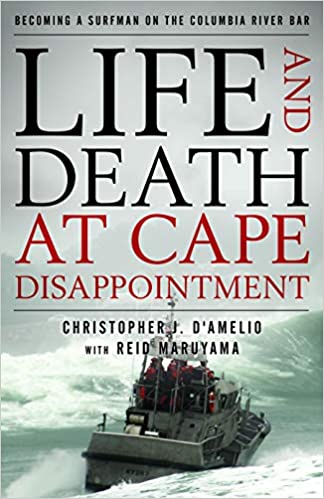Reviewed by LCDR Donald A. Baker, USN
An ancient Jewish teacher once said, “Greater love has no one than this, than to lay down one’s life for their friends.” If risk to life and limb is any indication of an individual’s commitment to this ideal, then Coastguardsman Chris D’Amelio’s very personal and intimate account of rescuing fellow citizens in his memoir Life and Death at Cape Disappointment is a consummate example of what the principle looks like in practice.
As a qualified surfman, the Coast Guard’s highest small boat qualification, D’Amelio had first-hand experience performing search and rescue (SAR) missions from his post at Coast Guard Station Cape Disappointment— a section ominously nicknamed “The Graveyard of the Pacific” for its treacherously dangerous and volatile sea conditions—from the late 1990s to the mid-2000s. D’Amelio’s memoir recounts the most noteworthy of his documented 430 SAR cases, one of which earned him national recognition.
The book introduces the uninitiated to life as a Coastguardsman at an intense duty station where physical limits of human and machine (not to mention the psychological strain that comes with putting one’s life in perilous situations) are put to the test as frequently as the tide shifts directions in the Columbia River.
D’Amelio’s first-person perspective and tone throughout the book is not altogether different from war memoirs like With the Old Breed or Helmet for my Pillow, as the authors relay their thoughts and emotions to the reader. D’Amelio’s prose is basic and much less refined than Sledge or Leckie’s, but the simplistic style adds an element of authenticity that connects well to both the military and civilian reader. A second difference between other military autobiographical works and D’Amelio’s is that the protagonists of such stories typically live through some harrowing war episode—or several of them—where they encounter a fierce enemy combatant under dire conditions. The book maintains the tradition of other war books in these ways but here, violence and destruction come from the strong hand of the sea where D’Amelio and his crew battle storm-forced winds and intense wave-sets that often exceed twenty feet in height in relatively small Coast Guard vessels. Not all battles with Mother Nature are won, as D’Amelio attests, with some of his calls for assistance ending in fatal disappointment, hence the appropriate name for the Coast Guard station where the Pacific Ocean and Columbia River meet.
D’Amelio sets out to tell the story of his time at Station Cape Disappointment, and he largely succeeds in this endeavor. His accounts of a rescue attempt of a brother and sister falling off a cliff, providing aid to a fisherman who burned his face off when his engine caught fire, the retrieval of a suicide victim’s body, and the unfortunate capsized boat that caused the drowning of its operator are particularly captivating to the reader. His surfman magnum opus is what he refers to as the “Peacock Spit Case,” where D’Amelio and his crew saved three family members from inevitable drowning after their boat flipped in heavy surf. For his action, D’Amelio received the Association for Rescue at Sea Gold Medal.
As captivating as his narratives are in certain places, he weaves uncertainty into his book through his word choices. He cannot remember if it wass “nine or ten” fishing boats that got stuck out to sea or the average number of dead bodies each Coast Guard member of his station retrieves from the water, guessing at maybe “two or three a year.” Of particular concern is the uncertain status of a rescued burn victim. D’Amelio admits remembering the details differently than another crew member who was on the same case. There are numerous such instances in the book.
Even still, the book achieves the goal of adequately depicting the Coastguardsman’s experience at Cape Disappointment. As much as D’Amelio’s volume captures his official search and rescue vocation, it is equally a very personal journal that chronicles his journey through family life as a husband and father. He acknowledges mistakes made in both his personal and professional lives. Still, he navigated both to success as he obtained a noteworthy Coast Guard career (achieving the rank of Chief Warrant Officer 3), an achievement only surpassed by his successful marriage and raising of three children. This is the book’s strength and where it most clearly succeeds. It is an honest, open, and raw story of one man’s life voyage that happens to include his precarious time as surfman at the infamous Cape Disappointment.
LCDR Donald A. Baker, USN is a Military Faculty member at the Joint Forces Staff College.
Life and Death at Cape Disappointment: Becoming a Surfman on the Columbia River Bar (Christopher D’Amelio and Reid Maruyama, Lyons Press, Guilford, CT, 2021)


